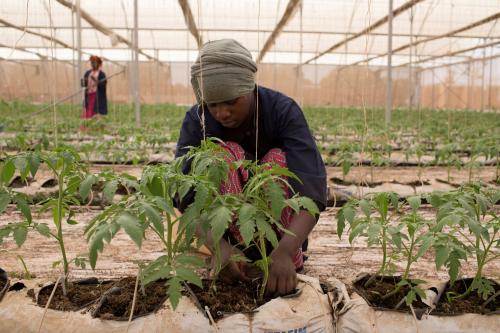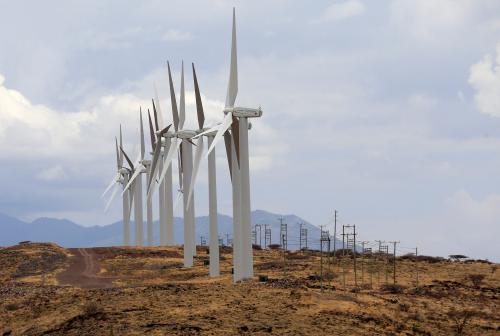The Biden administration to terminate AGOA access for Ethiopia, Mali, and Guinea
On Tuesday, November 2, the Biden administration announced in a letter to Congress that Ethiopia, Guinea, and Mali will be removed from the list of beneficiaries of the African Growth and Opportunity Act (AGOA). The letter stated that Guinea and Mali will be removed for “not having established, or not making continual progress toward establishing, the protection of the rule of law [and] political pluralism,” among other requirements. Countries in noncompliance will no longer be able to benefit from trade preferences under AGOA, which include quota- and duty-free entry for some classes of goods, most notably textiles and apparel. U.S. Trade Representative Katherine Tai indicated in a statement that the U.S. government would “provide each country with clear benchmarks for a pathway toward reinstatement and … work with them to achieve that objective.”
Also in the letter to Congress, the administration stated that Ethiopia, which sent upwards of $500 million in goods to the U.S. in 2020, is not in compliance with AGOA requirements given “gross violations of internationally recognized human rights.” War has been raging in Ethiopia between federal soldiers and the Tigray People’s Liberation Front (TPLF), provoking abundant claims of human rights abuses, including sexual violence and mass civilian killings.
For more on the U.S.-Ethiopia relations related to Ethiopia’s civil conflict, read “Ethiopia, human rights, and the internet.”
BioNTech announces African mRNA vaccine manufacturing partnerships; syringe shortages hinder vaccination effort; and the African Union signs deal to acquire Moderna mRNA vaccines
Last week, BioNTech, the German company behind the Pfizer-BioNTech COVID-19 vaccine, signed an agreement with Senegal and Rwanda to construct Africa’s first start-to-finish mRNA vaccine factories and announced that construction will begin in mid-2022. The company is working with the Institute Pasteur in Dakar, Senegal, which launched a $200 million project to bolster its vaccine manufacturing capabilities this year, and the Rwandan government. In early July this year, Rwanda received more than $3 million from the European Union to assist in upgrading laboratory capacity, acquiring modern laboratory equipment, and attracting investors to manufacture mRNA COVID-19 vaccines. In total, these two facilities in Senegal and Rwanda are projected to produce 50 million doses of the Pfizer-BioNTech COVID-19 vaccine annually, with the ability to increase capacity as needed.
The former director of policy and analysis with Doctors Without Borders, however, condemned the deal as “too little too late” and criticized BioNTech for its reluctance to release the licensing of its mRNA vaccine technology. In response to the continent’s reliance on foreign pharmaceutical producers, South African scientists are attempting to replicate the mRNA vaccine technology with open source, publicly available research.
Related, as COVID-19 vaccination ramps up across the continent, a shortage of syringes in Africa is adding to the region’s list of obstacles to immunize its 1.3 billion people. On October 28, the World Health Organization (WHO) released a statement predicting a “shortfall of up to 2.2 billion auto-disable syringes for COVID-19 vaccination and routine immunization in 2022.” This gap makes the market for these syringes “tight and extremely competitive.”
In related news, the African Union has signed a deal brokered by the White House to acquire 110 million Moderna mRNA vaccines, which are reported to have the highest long-term efficacy rate of COVID-19 vaccines. According to the deal, 15 million doses will be delivered to the continent before the end of the year and the rest will be delivered sometime in 2022. Notably, the company was recently lambasted by The New York Times, which criticized Moderna’s prioritization of delivering doses to high-income countries, which pay a higher premium per dose, while stymying the delivery of vaccines to low-income countries in the developing world—which have signed deals agreeing to pay up to one-third of the price of high-income countries.
Africa requests the international community to support climate efforts as Nigeria and South Africa look toward renewable energy
As COP26 moves forward in Glasgow, negotiators from African countries continue to emphasize the urgency of international support in the fight against climate change and that the fight against climate change will not be won if it is not fought in Africa. In that vein, on Tuesday, current chairperson of the African Union, DRC President Felix Tshisekedi, stated that “Other parts of the world must contribute half of the $25 billion needed by Africa to run adaptation programs over the next five years.”
On a related note, the African Group of Negotiators on Climate Change called for $1.3 trillion a year in climate financing to become available to African countries by 2030, as the previous target of $100 billion by 2020—pledged in 2009—was not reached. Chair Tanguy Gahouma-Bekale reiterated his group’s request and underscored the extent of the global problem, stating that “Support needs to reflect the real cost of climate change.”
In his speech to the gathered parties, President Muhammadu Buhari stated that emissions can be reduced by 47 percent if Nigeria gets the financial assistance, technology transfer, and capacity building support it needs from international partners. According to Bloomberg, Buhari said earlier this year that Nigeria would need more than $400 billion for a successful transition to other energy sources. Despite lack of funding, Nigeria has pledged to reach net-zero emissions by 2060.
Meanwhile, African countries and innovators continue to implement policies and technologies to contribute to climate solutions. In fact, four East African innovative organizations from Kenya, Uganda, and the Democratic Republic of the Congo have been awarded 2021 Ashden Awards, which are organized by the London-based charity and given out at the COP26 summit. YICE Uganda (a grassroots initiative) won the Ashden Award for Regenerative Agriculture for its work on regenerative agriculture for smallholder farmers. New Energy Nexus Uganda won the Ashden Award for Energy Access Innovation for its work supporting clean energy entrepreneurs with financing and business coaching. Solar Freeze of Kenya won the Ashden Award for Humanitarian Energy for its work in pioneering cold storage units powered by renewable energy for smallholder farmers. Finally, Mbou Mon Tour of the DRC won the Ashden Award for Natural Climate Solutions for its work bolstering support and funding for conservation challenges.
The Brookings Institution is committed to quality, independence, and impact.
We are supported by a diverse array of funders. In line with our values and policies, each Brookings publication represents the sole views of its author(s).







Commentary
Africa in the news: AGOA removals, vaccine update, and COP26-related news
November 6, 2021